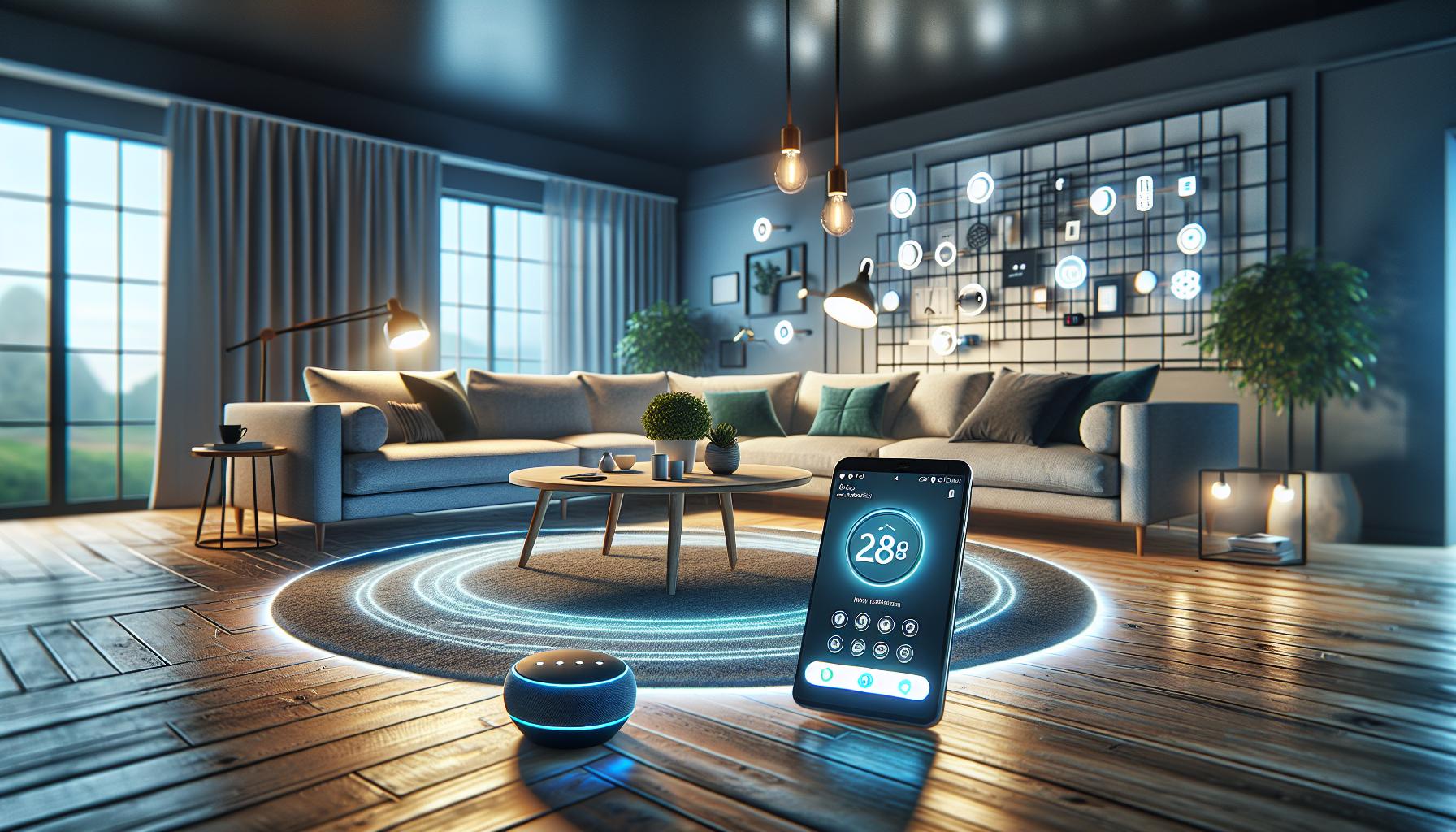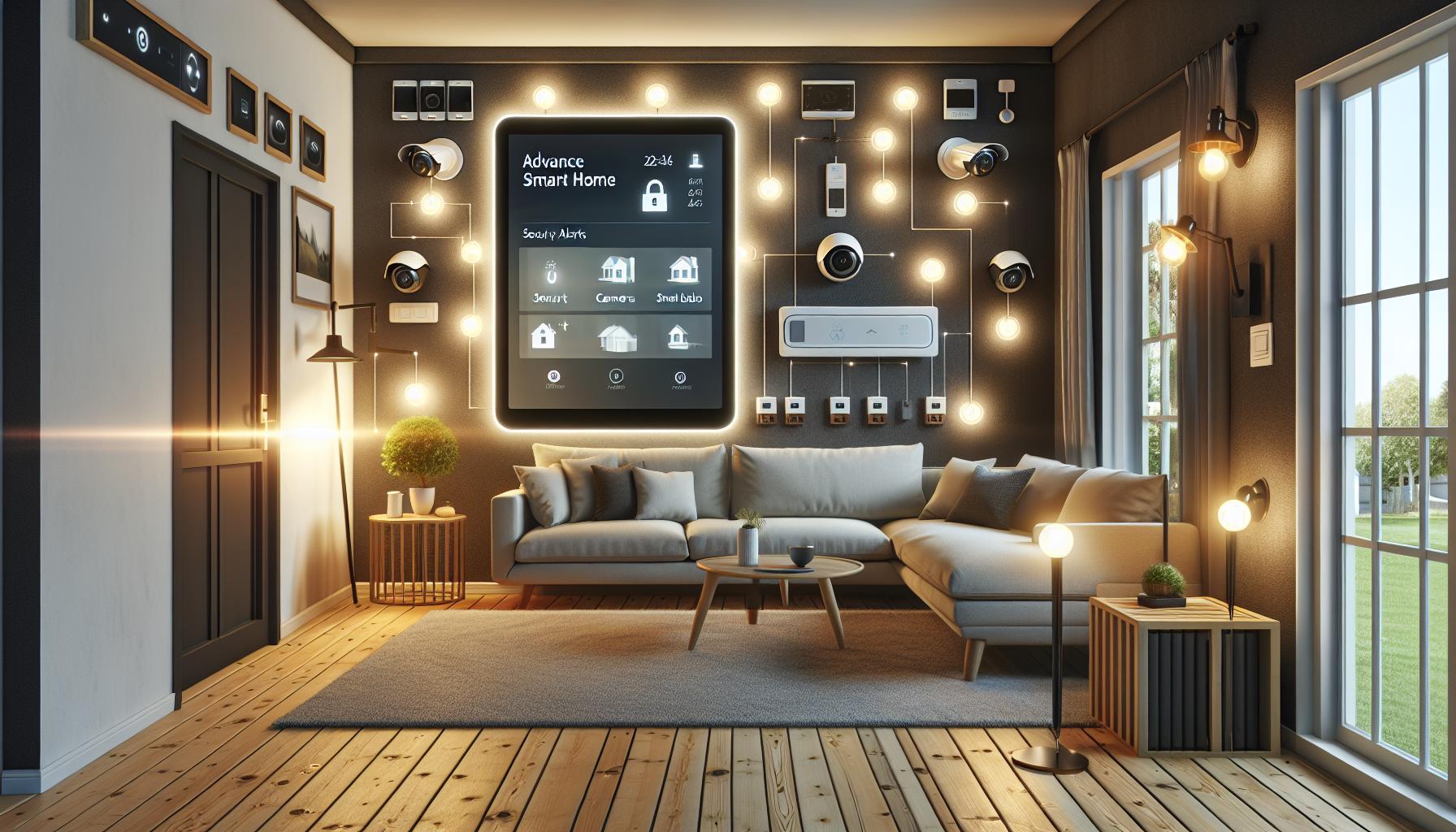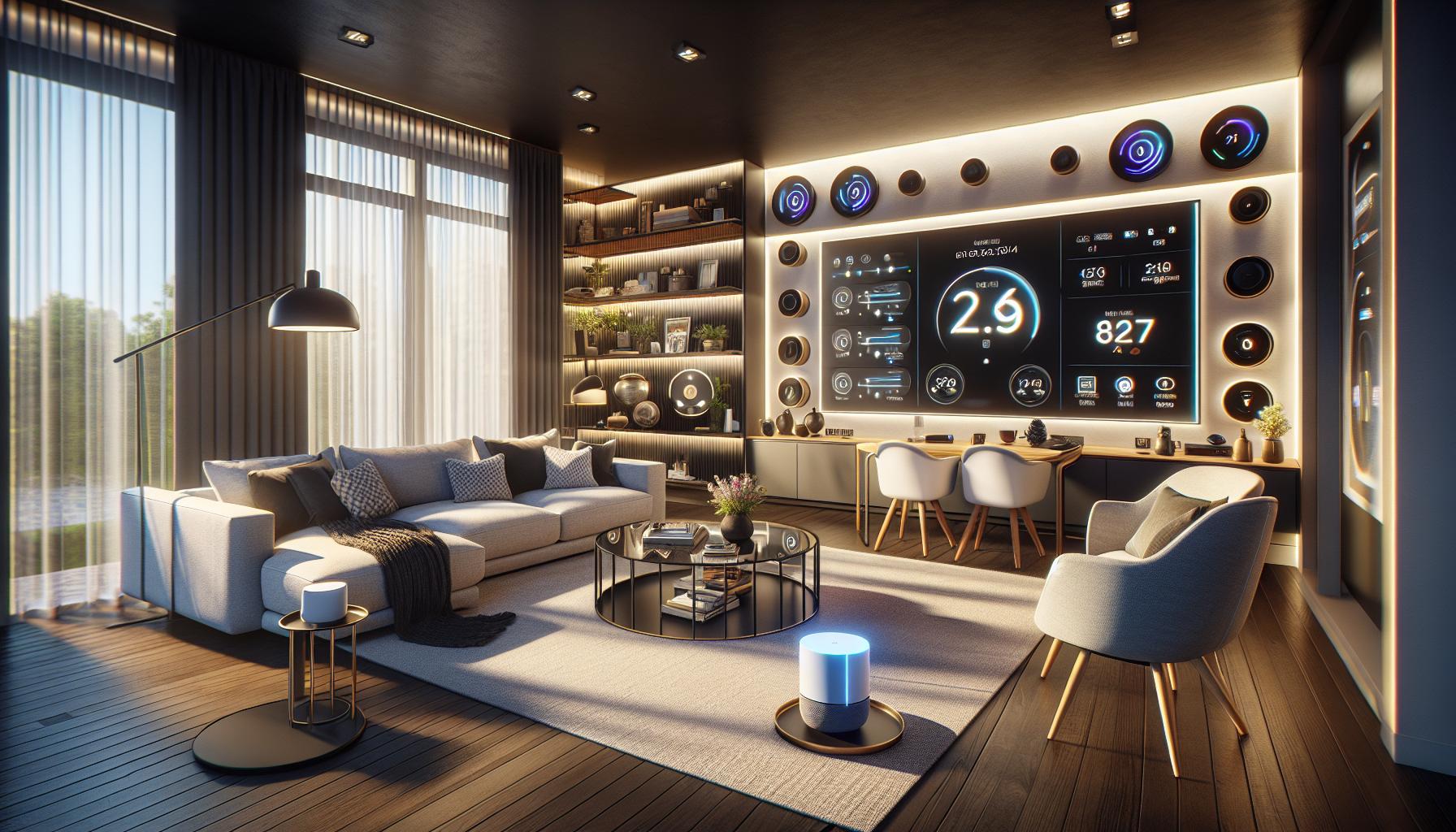Key Takeaways
- Smart Home Benefits: Implementing smart home projects leads to improved energy efficiency, enhanced security, increased convenience, and greater comfort in daily living.
- Diverse Project Ideas: Popular smart home projects include smart lighting, security systems, thermostats, smart speakers, doorbells, automation systems, and smart appliances that cater to various needs and preferences.
- Energy Efficiency Focus: Upgrading to smart devices like thermostats and energy monitoring systems can significantly lower utility bills and reduce environmental impact.
- Customization Options: Homeowners have the flexibility to tailor smart home technologies to their specific lifestyles, ensuring personalized experiences in their living spaces.
- Challenges to Address: Key challenges for successful smart home implementation include compatibility issues, network reliability, security concerns, and maintenance requirements that need careful consideration.
- Future-Proofing Homes: Investing in smart home technology not only enhances current living conditions but also prepares homes for future advancements and innovations in smart devices.
Smart home technology is transforming the way people live, making homes more efficient and convenient. With a variety of innovative gadgets and systems available, homeowners are increasingly looking to enhance their living spaces. From energy-saving solutions to security enhancements, smart home projects can elevate comfort and streamline daily routines.
Exploring smart home project ideas not only sparks creativity but also empowers individuals to take control of their environments. Whether it’s automating lighting or implementing a smart thermostat, these projects offer practical benefits while adding a modern touch. Dive into the world of smart homes and discover how simple upgrades can lead to a more connected and enjoyable living experience.
Smart Home Project Ideas
Smart home project ideas offer numerous opportunities for enhancing everyday living through technology. These projects can vary from simple installations to complex systems, focusing on automation, security, energy efficiency, and convenience.
- Smart Lighting: Integrating smart bulbs and switches allows homeowners to control lighting remotely and schedule it based on their needs. Brands like Philips Hue and LIFX provide customizable options that enhance ambiance and save energy.
- Home Security Systems: Installing smart security cameras and motion sensors enhances safety. Devices from companies such as Ring and Arlo provide real-time alerts and remote monitoring through smartphone apps.
- Smart Thermostats: Upgrading to smart thermostats optimizes energy consumption. Products like Nest and Ecobee learn user preferences, adjust temperatures automatically, and reduce utility bills.
- Smart Speakers: Incorporating smart speakers like Amazon Echo or Google Nest enables voice-controlled management of various smart devices, streaming music, and accessing information seamlessly.
- Smart Doorbells: Installing smart doorbells enhances home security and convenience. These devices, like those from Ring, allow homeowners to see and communicate with visitors remotely.
- Home Automation Systems: Implementing a comprehensive home automation system allows integration of various smart devices into a single platform. Solutions like Samsung SmartThings provide centralized control over lighting, security, and climate.
- Smart Appliances: Upgrading to smart appliances, including refrigerators, ovens, and washing machines, enhances efficiency. Brands such as LG and Samsung offer models that can be controlled remotely and provide notifications about operation status.
- Energy Monitoring Systems: Utilizing energy monitoring systems helps track and manage energy usage across the home. Devices like Sense or TP-Link Kasa provide insights into consumption patterns.
Each of these smart home project ideas illustrates the potential for transforming spaces into efficient, convenient, and enjoyable living environments. By exploring these options, homeowners can select the projects that best fit their lifestyles and priorities.
Popular Smart Home Technologies

Smart home technologies encompass various devices and systems that enhance modern living. These innovations improve efficiency, convenience, and security in residential spaces.
Smart Lighting Solutions
Smart lighting solutions involve LED bulbs and smart switches that provide control over home illumination. Homeowners can customize lighting settings through mobile apps or voice commands. Features include:
- Remote Control: Users can adjust lighting from anywhere.
- Scheduling: Programs define when lights turn on or off automatically.
- Color Customization: Options for changing colors create mood-specific environments.
- Energy Efficiency: Smart bulbs consume less power than traditional options, lowering energy bills.
Examples include Philips Hue and LIFX, which integrate seamlessly with voice assistants like Amazon Alexa and Google Assistant.
Home Automation Systems
Home automation systems centralize control of various smart devices, creating a cohesive smart home environment. These systems enhance convenience and security through integrations. Key aspects include:
- Centralized Control: Users manage devices from one app or interface.
- Scene Setting: Predefined scenes adjust multiple devices simultaneously, like “movie night” dimming lights and lowering shades.
- Integration Compatibility: Compatibility with devices across different brands ensures flexibility and scalability.
- Automated Routines: Routines can connect daily tasks to triggers, like turning on lights when someone arrives home.
Prominent home automation systems include Samsung SmartThings, Apple HomeKit, and Google Nest, all offering extensive compatibility with numerous smart devices.
DIY Smart Home Project Ideas

Explore various smart home projects that enhance security and energy efficiency, providing practical benefits and optimizing living spaces. Below are some specific ideas for smart security systems and energy efficiency projects.
Smart Security Systems
Implementing smart security systems increases safety and peace of mind. Key components include:
- Smart Cameras: Install cameras like Ring or Arlo for real-time monitoring and alerts. Users access feeds via smartphones or tablets.
- Smart Locks: Use smart locks such as August or Schlage for keyless entry. These locks often allow remote locking and unlocking, enhancing convenience.
- Motion Sensors: Deploy motion sensors that activate lights or send alerts when triggered. Brands like Philips Hue provide integrated systems.
- Video Doorbells: Choose video doorbells like Nest Hello for enhanced monitoring. They offer HD video, night vision, and two-way audio for communication.
- Security Alarms: Integrate alarms that notify users of unusual activity. Systems like ADT provide comprehensive solutions for whole-home security.
Integrating these components forms a cohesive security ecosystem, maximizing protection against potential threats.
Energy Efficiency Projects
Energy efficiency projects are essential for reducing utility costs and environmental impact. Effective strategies include:
- Smart Thermostats: Install smart thermostats such as Ecobee or Nest to optimize heating and cooling. Scheduling and remote access capabilities improve energy savings.
- Smart Lighting: Utilize smart bulbs and switches for customizable lighting. Options like Philips Hue allow users to control brightness and color, enhancing ambiance.
- Energy Monitoring Devices: Employ smart plugs or whole-home energy monitors to track consumption in real-time. Devices like Sense provide insights into usage patterns.
- Automated Blinds: Integrate smart blinds that adapt based on sunlight exposure. Brands like Lutron facilitate improved temperature regulation and privacy.
- Smart Appliances: Opt for energy-efficient smart appliances that minimize usage without sacrificing performance. When operated during off-peak hours, these appliances save significant energy.
Implementing these projects contributes to a sustainable and cost-effective living environment while enhancing overall comfort.
Benefits of Implementing Smart Home Projects

Implementing smart home projects provides numerous advantages that enhance daily living.
Energy Efficiency
Smart home technology significantly reduces energy consumption. Smart thermostats adjust heating and cooling based on occupancy and preferences, resulting in lower energy bills. Automated lighting systems utilize LED bulbs, which consume less power, and can be scheduled to operate only when needed.
Enhanced Security
Smart home projects improve home security. Smart cameras and doorbell systems allow homeowners to monitor their property in real-time. Smart locks provide remote locking and unlocking, increasing safety and convenience. Motion sensors activate alerts for unusual activity, ensuring prompt responses to potential threats.
Increased Convenience
Home automation simplifies everyday tasks. Voice-activated smart speakers enable users to control devices hands-free. Remote access to smart appliances allows operation from anywhere, streamlining chores such as laundry or cooking. Centralized control systems bring all devices together, making it easier to manage the home environment.
Improved Comfort
Smart technologies enhance comfort levels. Automated blinds adjust according to sunlight, maintaining optimal indoor temperatures. Smart lighting offers customization for ambiance and mood, adapting to different activities throughout the day. These features create a more enjoyable living space.
Cost Savings
Financial benefits accompany the implementation of smart home projects. Energy-efficient devices reduce monthly bills, while robust security measures decrease the likelihood of theft, thereby lowering insurance premiums. Monitoring energy usage with smart devices identifies areas for further savings.
Customizability
Smart home systems provide flexibility and personalization. Homeowners can choose specific technologies that align with their lifestyles, preferences, and budgets. This customization results in a tailored living environment that meets individual needs.
Future-Proofing
Investing in smart home technology prepares homes for future advancements. Upgrading systems or adding new devices remains straightforward. As technology evolves, homeowners benefit from enhanced features without a complete overhaul of existing setups.
Challenges to Consider in Smart Home Projects
Smart home projects face several challenges that can impact effectiveness and user satisfaction.
- Compatibility Issues
Devices may not work together due to different communication protocols. Ensure the selected products support common standards like Zigbee or Z-Wave.
- Network Reliability
A strong and reliable internet connection is essential for proper functionality. Wi-Fi dead zones can disrupt communication with smart devices.
- Security Concerns
Smart devices can be vulnerable to hacking and unauthorized access. Implement strong passwords and consider using a separate network for smart devices to enhance security.
- Initial Costs
High upfront costs may deter some homeowners. Budget for both the devices and any installation fees for more complex systems.
- User Experience
Complexity in setup and operation could overwhelm users. Choose devices with user-friendly interfaces and accessible customer support.
- Privacy Issues
Data collection by smart devices raises privacy concerns. Research and select devices with clear privacy policies and robust data protection measures.
- Power Consumption
While smart devices aim to improve efficiency, some may consume more power than expected. Monitor energy usage to ensure overall savings.
- Maintenance Requirements
Regular updates and maintenance are necessary for optimal performance. Be prepared for ongoing care to keep systems running smoothly.
By addressing these challenges, homeowners can enhance their smart home project experiences and maximize the benefits of automation and connectivity.
Embracing Smart Home Technology
Embracing smart home technology opens up a world of possibilities for homeowners. By exploring various project ideas, individuals can enhance their living spaces with convenience and efficiency. Whether it’s automating lighting, improving security, or optimizing energy use, each project contributes to a modern lifestyle.
The benefits extend beyond mere comfort. Homeowners can enjoy cost savings and increased safety while also future-proofing their investments. As technology evolves, so do the opportunities for upgrades and enhancements.
With the right planning and knowledge, anyone can transform their home into a smart haven that reflects their unique needs and preferences. The journey toward a smarter home is not just about gadgets; it’s about creating a more enjoyable and efficient living experience.